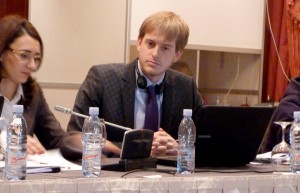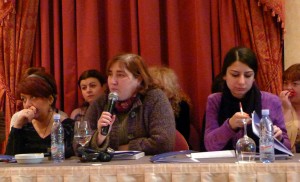 TBILISI, DFWatch – Georgian media is at the mercy of a murky network of friends that extends into both government and the private sector, used for exerting political influence over what is being reported.
TBILISI, DFWatch – Georgian media is at the mercy of a murky network of friends that extends into both government and the private sector, used for exerting political influence over what is being reported.
This monopoly is getting worse, as it is about to grab the newspaper sector too, which has been the only real free media in the country until now.
These are the main findings of a new study carried out by Transparency International Georgia (TI) about the Georgian advertising market.
It concludes that there is a marked lack of competition in the sector. It mostly revolves around a small network of friends, relatives and business partners of advertisement czar Davit Kezerashvili, the former Defense Minister who led the army into the unsuccessful war against Russia in 2008.
TI found that just a handful of companies are in control of almost the entire advertising sector in the country.
‘Especially we have a new monopoly that immerged earlier this year – General Media, which manages about 70% of all advertising segments in Georgia. They have a de facto monopoly on all advertising slots on national TV stations,” says Mathias Huter, one of the authors of the report. He is senior analyst and program manager at TI Georgia and presented their findings Tuesday in front of a large audience, including media representatives and independent journalists at the Tbilisi Marriott hotel.
78% of all advertising spending comes for TV advertising, mostly on Imedi and Rustavi 2, and this is the largest sector in this market, while internet advertising has just a tiny share, and print media is also dwarfed by TV in terms of advertising. The report says that advertisers try to cooperate with those media outlets that have cozy relations with the government, and vice versa don’t advertise in independent media, out of fear that it might have negative consequences for their business.
“The advertising market is strongly politicized, and one of the aspects we are concerned about is that government owned entities continue to give advertising to specific media outlets, that are loyal to the government,” Huter says.
As an example he mentions two popular magazines in Georgia: Tabula and Liberali. The founder and editor-in-chief of Tabula is Tamara Chergoleishvili, wife of Giga Bokeria, Secretary of the National Security Council of Georgia. It carries a lot of ads for the leading advertising companies in Georgia; including the Georgian lottery company, which is owned by the government.
“And we don’t see the same advertisements in the independent media outlets,” he adds.
“TI Georgia has seen advertising contracts that advertisers had signed with Kavkasia TV, an independent Tbilisi-based station, and the opposition-affiliated Maestro TV, that were canceled and withdrawn by the client a few days later, because of political pressure, representatives of these outlets say,” according to the report.
During a questions and answers session, a journalist from Tabula explained why there are more advertisements in their magazine than in Liberali. She said that Tabula has a higher profile, and this is documented by the surveys. According to her, this is a very important factor for the advertising companies when they decide in which media outlet they want to advertise.

Someone from the audience remarked that another reason is that Tabula had a high profile before it began publishing. Ia Antadze, journalist with Radio Liberty Georgia, commented that it’s not only about having a high profile. The independent TV channel Maestro, she said, is no less popular in Georgia than Tabula is, but still the channel has very few advertisements.
The report shows that a large part of the advertising market is not transparent and is dominated by General Media and Outdoor.ge.
Enough is known, however, to see that the tightly knit network that is running most of the sector is wrought with conflicts of interest. For instance there is Irakli Chikovani, who now heads the Georgian National Communications Commission (GNCC). He is a business partner of Giorgi Gegeshidze, the head of Rustavi 2; a clear conflict of interest in itself. Added to this, he also has a background from that TV station as a former director and co-owner. Even more, he has also been involved in the advertising industry as part owner of Media House.
The web of connections is seen in a diagram TI presented with an overview of which companies and individuals hold, own or have shares in companies within the Georgian ad market (see illustration).
TV viewers in Georgia often complain about the shear mass of ad time on the national government-friendly networks, films often cut off for up to half an hour. The amount of ads exceed the legal limits, but when an independent production company called Studio Monitor complained to the GNCC about this, Imedi and Rustavi 2 were only issued an insignificant fine of 2 500 lari each.
Another problem in Georgian media is the lack of transparency in terms of ownership.
“Several off-shore companies registered in Panama and the British Virgin Islands are used to conceal ownership and financial flows,” the report says. “A suspiciously high number in official ownership structures of single companies and the apparent use of front men are undermining the sector’s transparency.”
And now this network of friends, extending through both government and the private sector, is finding new ways of expanding their dominance, at the expense of freedom of speech. As reported by DFWatch, Tbilisi City Hall is moving forward with a controversial system for kiosks that will replace today’s newspaper sellers; long an important part of the capital’s vibrating nerve and a stronghold of media independence. Mathias Huter points out that this kiosk system could be extended to the whole country, placing the entire newspaper distribution under government control.
There are signs of such a development. Huter says relatives and friends of the advertisement czar, Davit Kezerashvili, are taking control over kiosks run by the Georgian Post. The result could be that the government gets a virtual stranglehold over all Georgian newspapers.

